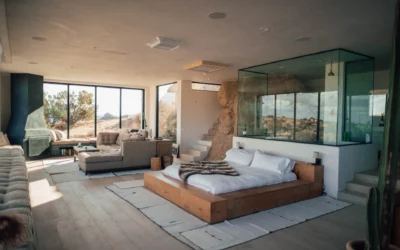Airbnb Minimum Stay: What it is and what are the advantages in 2023
6 June 2023
Share this article on Social Networks:
Opening a B&B can be an exciting venture but also full of challenges. One of the crucial decisions you have to make is the ‘minimum stay’ policy. This policy, determined based on the time of the year, can have a significant impact on your operations and the satisfaction of potential customers. We will explore what ‘minimum stay’ means, how to set Airbnb Minimum Stay, and why it is important.
The minimum stay policy is important because it directly affects the profits of the accommodation facility, the guest’s satisfaction and the guest experience. Imposing minimum stays of 3 nights, for example, can help reduce operational costs. There will be fewer check-ins and check-outs, reducing the time and costs associated with room cleaning and reservation management.
Maximizing the profitability of the accommodation facility is one of the major benefits of implementing a minimum stay. Here are some situations where implementing the minimum stay can be particularly advantageous:
- High season periods: During holidays or local events, a minimum stay can ensure full occupancy and maximize revenue for each booking.
- Low season periods: During the off-season or weekdays, a minimum duration can stimulate bookings by offering discounted or advantageous rates only for minimum stays of several nights.
- Special event periods: During events like concerts, festivals, or conferences, implementing a minimum stay ensures that rooms are available for the entire duration of the event, avoiding partial bookings that would compromise overall profitability.
- High-demand periods: During periods of high demand, a minimum stay can help manage room availability by requiring a minimum stay to ensure rooms are available for customers willing to stay for a longer period.
- Limiting customer options: A minimum stay can limit options for potential customers, leading to loss of bookings and reduced flexibility for guests.
- Possibility of guest dissatisfaction: Guests forced to book for a longer period than desired may feel dissatisfied or frustrated, affecting their overall experience, the accommodation’s reputation and its Airbnb reviews.
- Increased cancellation risk: A strictly imposed minimum stay can increase the risk of cancellations from guests seeking more flexible options, resulting in revenue loss and increased complexity in reservation management.
- Demand variations: Implementing the minimum stay may not account for demand variations over time, reducing booking opportunities during periods of low demand or lacking flexibility during periods of high demand.
Determining the appropriate Airbnb Minimum Stay policy for your B&B or vacation rental requires careful thought and planning. There is no universal solution that applies to everyone, so consider these factors:
- Location and target market: If you are in a popular tourist destination with a high season, it may be appropriate to have a longer minimum stay policy. If you primarily attract business travelers or tourists who prefer shorter stays, a more flexible minimum stay policy may be more suitable.
- Operational costs and revenue management: Evaluate the daily operational costs of your B&B, including cleaning, maintenance, energy, and water. If costs are high, a longer minimum stay policy may be economically advantageous, considering the assistance of a revenue manager. To understand how to set the best B&B and hotel rates types and optimize your revenue, explore what are metasearch engines.
- Demand and supply: During high season periods, a longer minimum stay limit may be beneficial when demand exceeds supply. During the low season, on the other hand, you may consider a more flexible minimum stay policy to attract more customers.
- Competition: Analyze the minimum stay policy adopted by your direct competitors. Adapt your policy to maintain competitiveness in the market, if necessary.
- Customer type: Consider the profile of your typical customers. If your B&B or vacation home primarily attracts families or groups staying for longer periods, a longer minimum stay may be advantageous. If your target audience is business travelers or tourists who prefer shorter stays, a more flexible minimum stay policy may be more attractive.
- Seasonality: Evaluate seasonal fluctuations in demand and supply in your area. During high season, a longer minimum stay may maximize profits, while during the low season, you may consider a more flexible minimum stay policy to attract more customers.
- Profitability goals: Define your financial objectives. If you want to maximize revenue, you may opt for a longer minimum stay to increase occupancy and profit. If the main goal is to attract more customers and maximize guest satisfaction, a more flexible minimum stay policy may be preferable.
Drafting a comprehensive Bed and Breakfast business plan can further aid in making well-informed decisions regarding your minimum stay policy and other operational strategies.
Setting minimum nights on Airbnb (and vacation rental websites like Airbnb) is a straightforward process that allows hosts to define the minimum duration guests must book when making a reservation.
By setting this requirement, hosts can ensure that their property is booked for a specified minimum stay, helping them manage their operations effectively and attract guests who align with their preferred stay duration.
To set minimum nights on Airbnb, hosts can navigate to their listing’s settings and locate the option to specify the minimum stay requirement. By entering the desired number of nights, hosts can establish their preferred minimum duration.
It’s important to consider factors such as location, target market, competition, and seasonality when determining the appropriate minimum nights requirement.
This feature enables hosts to maintain control over their booking schedule and provide a consistent experience for their guests.
Moreover, using an ical connection can further optimize your listing’s availability across different booking platforms.
Managing this type of policy can be challenging, especially if your B&B, or vacation rental has many rooms or frequent reservation changes. Fortunately, there are accommodation management software solutions that can assist you in this task.
One example is Octorate, a comprehensive platform that allows you to easily manage bookings and policies, including the minimum stay. With Octorate, you can set your minimum stay policy for each room and time period, and the system will automatically apply it to all your bookings and channels.
Useful, isn’t it?
Furthermore, if you want to learn more about setting the minimum stay with Octorate, click on the previous link and start limiting the duration of stays for your bookings right away!
? What is Airbnb Minimum Stay?
The minimum stay policy is the minimum duration of a guest’s stay in an accommodation facility. For example, if a B&B has a minimum stay policy of two nights, guests must book for at least two nights.
? Why is having a Airbnb Minimum Stay policy important?
The minimum stay policy is important because it directly affects the profits of the accommodation facility and guest satisfaction. It can help reduce operational costs and maximize occupancy during periods of high demand.
? In which situations can implementing the minimum stay be particularly advantageous?
Implementing the minimum stay can be advantageous during high season periods, low season periods, special events, and periods of high demand.
❗ What are some potential disadvantages of this booking policy?
Some potential disadvantages of the minimum stay policy include limiting customer options, the possibility of guest dissatisfaction, increased cancellation risk, and inflexibility during demand variations.
? How can I determine the appropriate Airbnb Minimum Stay policy for my accommodation facility?
To determine the appropriate minimum stay policy, it is important to consider the location and target market, operational costs, demand and supply, competition, customer type, seasonality, and profitability goals.
? How can I efficiently manage the minimum stay policy?
Using accommodation management software like Octorate can simplify the management of the minimum stay policy. Such software allows you to easily set the policy for each room and time period, automating the application of the policy to bookings.
? How do I set minimum nights on Airbnb?
To set minimum nights on Airbnb, follow these steps:
1. Log in to your host account on Airbnb.
2. Go to your listing’s dashboard or settings.
3. Look for the option to set minimum nights or minimum stay requirement.
4. Enter the desired number of nights as the minimum stay requirement.
5. Save your changes to apply the minimum nights requirement to your listing.
Book a Free Demo
Book a Demo to see how Octorate can simplify the management of your Hotel, B&B, Vacation rental, Apartment or Hostel.
Try Octorate for free!
Subscribe to an annual plan and take advantage of an exclusive offer, tailored for your property!
Share with:
Alin Grigoras
Book a Free Demo
Book a Demo to see how Octorate can simplify the management of your Hotel, B&B, Vacation rental, Apartment or Hostel.
Related articles:
How to improve your Airbnb ranking thanks to reviews
Share this article on social networks:In this article from the blog of Octorate, we’ll try to explain how to...
Guest experience hotel: 5 ideas to enhance the Guest Experience of your accommodation facility in 2023
Share this link on your Social Media:Guaranteeing a memorable guest experience hotel can really make a...
Airbnb Superhost: what it is and what are its advantages
Share this article on social networks:In the vast universe of listings on Airbnb - in 2022, there are more...





